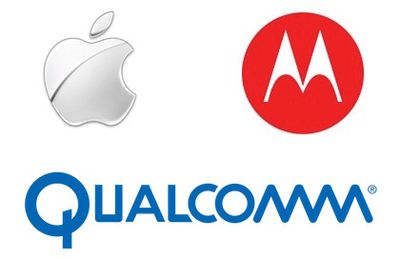Apple Sues Motorola Over Licensing of Cellular Technology by Qualcomm
Reuters reports that Apple has filed a lawsuit against Motorola Mobility alleging that Motorola has breached a licensing agreement with Qualcomm in its efforts to have a number of Apple's iOS devices banned from sale in Germany. Following a December victory by Motorola in a German court, Apple last week briefly pulled all 3G-enabled products with the exception of the iPhone 4S from its German online store. They were restored within a few hours after the injunction was suspended.

Today's lawsuit specifically addresses the iPhone 4S, which Motorola has also been seeking to block in Germany and other countries. The iPhone 4S utilizes Qualcomm's MDM6610 baseband chip, and Apple argues that Qualcomm's patent license with Motorola exhausts Motorola's rights to further royalties from Apple.
The suit, filed in a San Diego federal court, argues that Motorola's German lawsuit against Apple breaches terms of a patent licensing agreement between Motorola and Qualcomm. [...]
In the latest lawsuit, Apple says that as a Qualcomm customer, Apple is a third-party beneficiary of Motorola's agreement with Qualcomm. Under that agreement, Motorola's rights under certain patents are exhausted, Apple argues.
Apple has raised this issue before, perhaps most notably in defending itself against Samsung in Australia where it similarly claimed that Apple is protected from attacks based on these patents related to core cellular technologies by virtue of Qualcomm's licensing agreements. Motorola and Samsung have disagreed with Apple on that front, and Apple is now pressing the matter with a lawsuit of its own specifically addressing the issue as it relates to Motorola's efforts in Germany.
Popular Stories
Apple today shared an ad that shows how the upgraded Center Stage front camera on the latest iPhones improves the process of taking a group selfie.
"Watch how the new front facing camera on iPhone 17 Pro takes group selfies that automatically expand and rotate as more people come into frame," says Apple. While the ad is focused on the iPhone 17 Pro and iPhone 17 Pro Max, the regular iPhone...
In select U.S. states, residents can add their driver's license or state ID to the Apple Wallet app on the iPhone and Apple Watch, and then use it to display proof of identity or age at select airports and businesses, and in select apps.
The feature is currently available in 13 U.S. states and Puerto Rico, and it is expected to launch in at least seven more in the future.
To set up the...
Apple is planning to launch new MacBook Pro models as soon as early March, but if you can, this is one generation you should skip because there's something much better in the works.
We're waiting on 14-inch and 16-inch MacBook Pro models with M5 Pro and M5 Max chips, with few changes other than the processor upgrade. There won't be any tweaks to the design or the display, but later this...
It has been a slow start to 2026 for Apple product launches, with only a new AirTag and a special Apple Watch band released so far. We are still waiting for MacBook Pro models with M5 Pro and M5 Max chips, the iPhone 17e, a lower-cost MacBook with an iPhone chip, long-rumored updates to the Apple TV and HomePod mini, and much more.
Apple is expected to release/update the following products...
New MacBook Pro models with the M5 Pro and M5 Max chips could arrive as soon as Monday, March 2, according to Bloomberg's Mark Gurman.
In today's "Power On" newsletter, Gurman said that the release of new MacBook Pro models is tied to the release of macOS Tahoe 26.3. The launch is said to be slated for as early as the week of March 2. He added that the M4 Pro and M4 Max models on sale today...




















